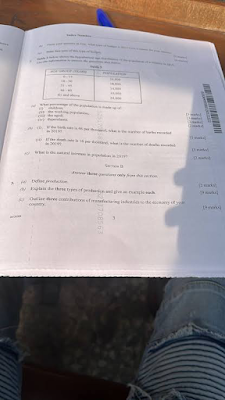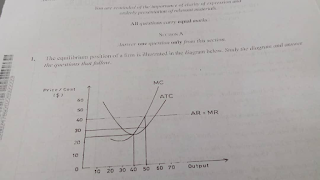2023 Get Free Live WAEC Economics (ECONS) Essay (Theory) and Objectives (OBJ) Questions and Answers for School Candidates | Free ECONS Questions and Answers EXPO Room for WAEC May/June (6th June 2023).
May/June 2023 for WAEC Free Economics Answer Room for Students
 |
| 2023 WAEC Economics Answer |
Tuesday, 6th June, 2023
Economics 2(Essay) – 9:30am – 11:30am
Economics 1(Objective) – 11:30 am – 12:30pm
ANSWERS TO 2023 WAEC ECONOMICS OBJECTIVES:
COMPLETED .
WAEC ECONOMICS 2023 THEORY OR ESSAY ANSWERS:
=====================================
NUMBER 3
(3ai)
Money cost is the actual amount of money spent on a good or service, while opportunity cost is the value of the next best alternative forgone in order to obtain that good or service.
(3aii)
A normal good is a good for which demand increases as income increases, while an inferior good is a good for which demand decreases as income increases.
(3b)
(i) Individuals: The scale of preference assists individuals by allowing them to rank their wants in order of importance and allocate their resources accordingly. This ensures that they spend their limited resources on the most important wants first.
(ii) Firms: The scale of preference helps firms in determining which goods and services to produce first, based on consumer demand. This ensures that they produce goods that are most in demand, maximizing profit.
(iii) Governments: The scale of preference assists governments in allocating resources to the most important needs first, such as infrastructure, healthcare, and education, in order to maximize the welfare of society.
=====================================
NUMBER 4
(4a)
Economic system refers to the structure and organization of production, distribution, and consumption of goods and services within a society.
(4bi)
Aim of production:
(i) Capitalist Economy: In a capitalist economy, the primary aim of production is to generate profit. Private individuals and businesses own and control the means of production, such as factories and businesses, and their main objective is to maximize their profits and wealth accumulation.
(ii) Socialist Economy: In a socialist economy, the aim of production is often centered around meeting the needs of society as a whole. The state or collective ownership controls the means of production, and the focus is on providing goods and services that benefit the entire population rather than solely pursuing individual profits.
(4bii)
Consumer sovereignty:
(i) Capitalist Economy: In a capitalist economy, consumer sovereignty is a fundamental principle. Consumers have the freedom to choose and influence what goods and services are produced through their purchasing decisions. Businesses respond to consumer demand and compete to attract customers by offering products and services that cater to their preferences.
(ii) Socialist Economy: In a socialist economy, consumer sovereignty is typically more limited. The state or central planning authority often determines the production and distribution of goods and services based on collective interests and social priorities. While consumers still have access to goods and services, their choices may be constrained or influenced by the state's decision-making processes.
(4biii)
Competition:
(i) Capitalist Economy: Competition plays a crucial role in a capitalist economy. Multiple private individuals and businesses operate within the market, striving to gain a competitive edge and maximize their profits. Competition fosters innovation, efficiency, and productivity, as businesses seek to attract customers and outperform their rivals.
(ii) Socialist Economy: Competition is less prevalent in a socialist economy, particularly in sectors where state ownership and central planning dominate. The priority is on cooperation and collective goals rather than competition among businesses. Some socialist economies may still allow limited competition in certain areas to spur innovation and efficiency.
(4c)
(i) Fixed Supply: Land is a finite resource, and its supply cannot be increased. The quantity and quality of land available for production remain relatively constant over time.
(ii) Immobility: Unlike other factors of production such as labor and capital, land is immobile. It cannot be easily relocated to different areas or transferred between industries. The location of land is an inherent characteristic that influences its value and productivity.
(iii) Heterogeneity: Land exhibits heterogeneity in terms of quality, fertility, natural resources, and geographical features. Different parcels of land have varying levels of suitability for specific purposes such as agriculture, mining, construction, or residential use.
=====================================
NUMBER 5
(5a)
A sole proprietorship is a business model where an individual is an owner as well as the operator of the business Whereas A partnership is a business model where two or more persons agree to carry on business and share profits and losses mutually.
(5b)
(i) Sole owner of the business
(ii) Unlimited liability
(iii) No legal entity
(iv) Sole decision maker
(5c)
(i) Generation of Income through Public Issue of Shares: One of the major channels through which Public Limited Companies generate capital is y selling shares to the public.
(ii) Security for Loan Advancement: Public Limited Companies can obtain and secure loans using the assets of the company as security as opposed to using the personal assets of the members.
(iii) Spreading Risks of Ownership: Because a Public Limited Company allows for pubic and unlimited membership, the risk of ownership is then spread amongst many people as opposed to being centered on a few as in the case of a Private Limited Company.
(iv) Separate Legal Identity: A duly incorporated Public Limited Company has an identity entirely different from that of the members. This means that the company is capable of independent existence and can enter into contractual transactions, acquire and own properties, and has the legal capacity to sue and be sued in its own name.
=====================================
NUMBER 6
(6a)
Location of industry may be defined simply as the sitting or establishment of a firm or industry in a particular place. An industry may be established either by individuals or government, either for economic or political reasons
(6bi)
Raw materials: Cement producing industries should be located close to sources of raw materials to reduce cost of transportation. Perishable goods like fruits, palm oil industries, etc should be located near their raw materials
(6bii)
Market: There should be ready market for the products of any industry to be sited in a place. Fragile goods like glass, bulky goods like cement and other perishable goods should be located near the market. Such industries located or directed towards the market are called market- oriented industries.
(6biii)
Government policy: Government can encourage the location of industries through certain policies like: Direct participation in setting up of industries. Creation of industrial zones in the country Provision of infrastructures like electricity, pipe-borne water, roads and tele- communications.
(6c)
(i)It encourages development: The growth of industries leads to an increase in production of goods and services.
(ii)Emergence of subsidiary firms: As major firms concentrate in one area, other subsidiary service firms that assist those major firms in the production of goods usually emerge.
(iii)Generation of employment: The concentration of many industries in an area leads to the creation of many job opportunities
=====================================
NUMBER 8
(8a)
embargo is a trade restriction, typically adopted by a government, a group of countries or an international organization as an economic sanction.
(8b)
(i) Imposition of tariffs is a source of revenue to the government and newly established companies are protected from competition from foreign companies.
(ii) If a country imports all sorts of goods without checks, it will suffer from Unfavourable balance of trade and payments and dumping of goods, especially in non industrialized country will occur if the country allows free trade to happen.
(iii) To check con-sumption pattern: If all sorts of goods are allowed to come into the country, the citizens will develop uncontrollable appetite for foreign goods and the rich are made to pay higher rate as tax than the low income earner.
(8c)
(i) It limits the level of variety of goods available in the country and other countries may also retaliate.
(ii) It may lead to increase in the price of goods especially if the tariff is too high.
(iii) Fall in the standard of living due to high taxes on imports and very protection of domestic industries may lead to inefficiency
Keep refreshing this page
Answers are loading..........................
2023 WAEC ECONOMICS ESSAY QUESTIONS:
Click Here to Get the full Answers
NB: Please only share this page with dependable students. We will hide this page as soon as the exam is over and replace it with a fresh one for the next exam. Please bookmark the website and come back later.
WAEC 2023 Economics Questions and answers
- Direct Mobile Payment Per Subject: N800 [Gets Answers On Time]
- Direct Mobile Payment Per Practical: N600 [Gets Answers On Time]
We will provide real of WAEC economics exam questions from previous papers in this page for applicants who will take the test.
2023 Questions and Answers for WAEC Economics.
Essay Paper No. 2
Five questions can be answered.
Write your responses in the attached answer booklet..
How to Pass WAEC economics exam Tip.
Passing the WAEC (West African Examinations Council) economics exam requires a combination of understanding the subject matter, effective study techniques, and exam preparation strategies. Here are some tips to help you pass WAEC economics:
Understand the Syllabus: Familiarize yourself with the WAEC economics syllabus. This will give you a clear idea of the topics and sub-topics you need to cover. Make a study plan based on the syllabus to ensure you cover all the necessary content.
Study Regularly: Dedicate regular study time to economics. Consistency is key. Create a study schedule that allows you to cover all the topics in a systematic manner.
Review Class Notes: Review your class notes and ensure that you have a good grasp of the fundamental concepts. If there are any areas where you feel weak, seek additional resources such as textbooks, online tutorials, or reference materials to clarify your understanding.
Practice Past Questions: Obtain past WAEC economics question papers and practice solving them. This will help you become familiar with the exam format, understand the type of questions asked, and identify areas where you need improvement.
Understand Question Requirements: Pay close attention to the requirements of each question. Read the questions carefully and make sure you understand what is being asked before attempting an answer. This will help you provide relevant and accurate responses.
Develop Answering Techniques: Learn and practice effective answering techniques. For example, when answering essay questions, structure your response logically with an introduction, main body, and conclusion. Support your arguments with relevant examples and data. Use diagrams, graphs, and tables where appropriate.
Seek Clarification: If you come across any concepts or topics that are unclear to you, seek clarification from your teacher, classmates, or online resources. Understanding the subject matter thoroughly will enable you to answer questions accurately.
Revise and Review: Regularly revise the topics you have covered to reinforce your understanding. Reviewing your notes, summarizing key points, and discussing concepts with peers can enhance your retention and comprehension.
Time Management: Develop effective time management skills during the exam. Allocate appropriate time to each section or question based on its marks. If you're unsure about a particular question, move on to the next one and come back to it later if time permits.
Stay Calm and Confident: On the day of the exam, stay calm and confident. Believe in your abilities and trust in your preparation. Avoid last-minute cramming, as it can increase anxiety and affect your performance.
Remember, passing the WAEC economics exam requires consistent effort, understanding of the subject matter, and effective exam preparation. By following these tips and putting in dedicated study time, you can increase your chances of success. Good luck!






